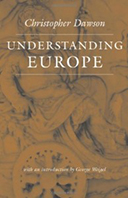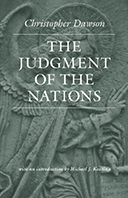This work was first published in 1952, at a time when steps were already being taken to bring a post-war European Union into being. Although Dawson was almost certainly aware of these developments, he makes no direct mention of them in this work. The following statement, however, would no doubt reflect his attitude towards the modern European project: “The activities of the modern planners and international reformers bear the same relation to the world crisis as the activities of a mining engineer or even a plumber to a volcanic eruption. They are sensible and rational and scientific, but they belong to an essentially different plane from that of the forces which they are attempting to master. The foundations of our world are shaken and we shall not save it by replanning the superstructure.”
Central Themes
Understanding Europe takes the form of a series of free-standing yet interrelated essays, the strands of which are all brought together in his concluding chapter ‘The Problem of the Future: Total Secularization or a Return to Christian Culture’, in which he states: “Therefore it is only by the rediscovery of the spiritual world and the restoration of man’s spiritual capacities that it is possible to save humanity from self-destruction.” The apocalyptic terminology is perhaps understandable in the light of the experience of the Second World War, the dropping of the atom bomb and the power struggle between the West and the USSR.
Part I of the work includes a concise summary of what Dawson terms the stages of Western Culture, beginning with Hellenism and ending with the secularisation and disintegration of Europe, “which is both the cause and the result of the two World Wars in whose shadow we live today.” He discusses the various attempts to unite Europe, and then goes on to look at different areas of Europe throughout history such as Germany and Central Europe, Eastern Europe and Russia, and the effects of European colonisation and imperialism.
Part II begins with a chapter on ‘Hegel and the German Ideology ’, in which Dawson demonstrates the influence of abstract thought on modern historical events. For Dawson, “The scientists and the technicians, the philosophers and the theologians and the men of letters have played a larger part than the politicians themselves in producing those great changes of culture which have transformed the modern world”.
In the closing lines of his chapter on ‘The Revolt against Europe’ Dawson has some very interesting thoughts on Europe as a political entity. He did not believe that Europe could be saved “by a drastic process of economic and political reorganization which would create a federal unity”, because Europe does not have a shared language or common political tradition, as exists, for example, in the United States. While recognizing the “evils and exaggerations of modern nationalism”, he believed that Europe has always been a ‘society of nations’ and therefore it is only by strengthening the unique traditions and values of each nation within a common European culture that Europe can be saved.
Evaluation of the Work
In a mere 200 pages, Dawson manages to cover a huge amount of ground, both historical and philosophical, which will leave the reader feeling enriched and far wiser about the nature of Europe as a spiritual, political and cultural entity. True to the book’s title, he succeeds in building up a very complete and insightful understanding of Europe.
PRAISE FOR THE ORIGINAL EDITION:
“A delicate and brilliant assessment of the subtle Christian and humanist forces which created and maintained our culture.” – Michael de la Bedoyere



